
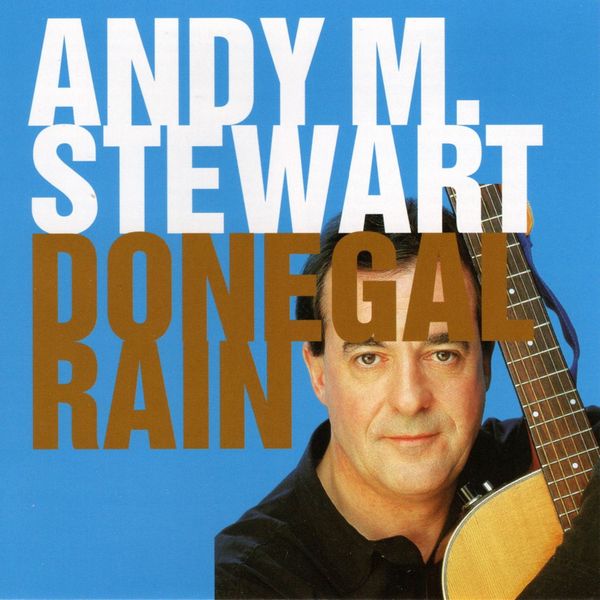 |
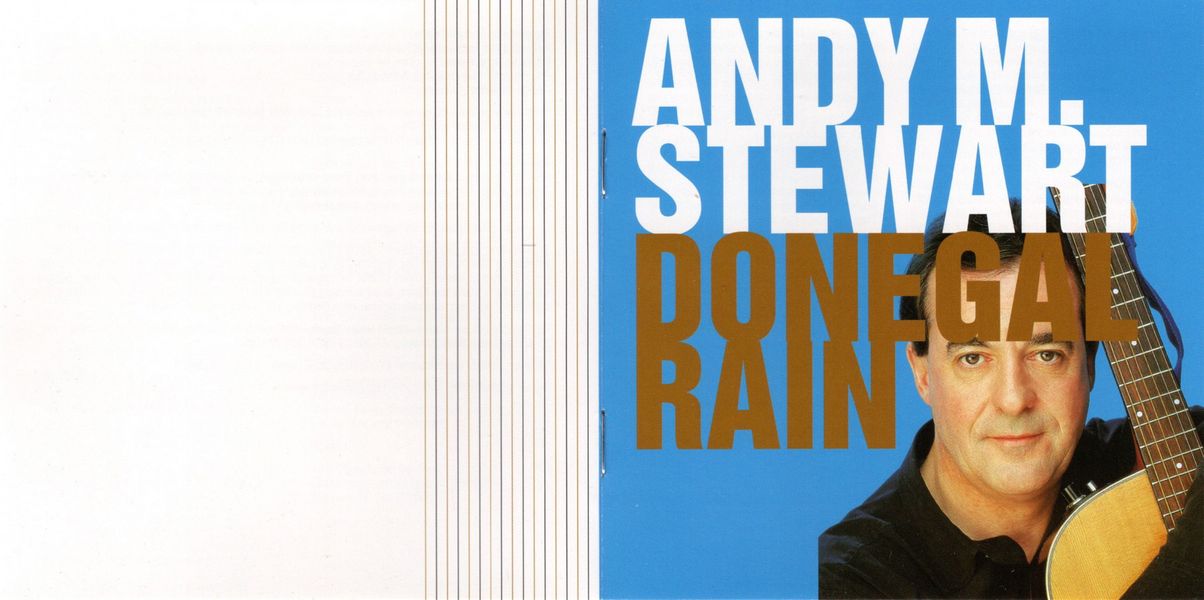
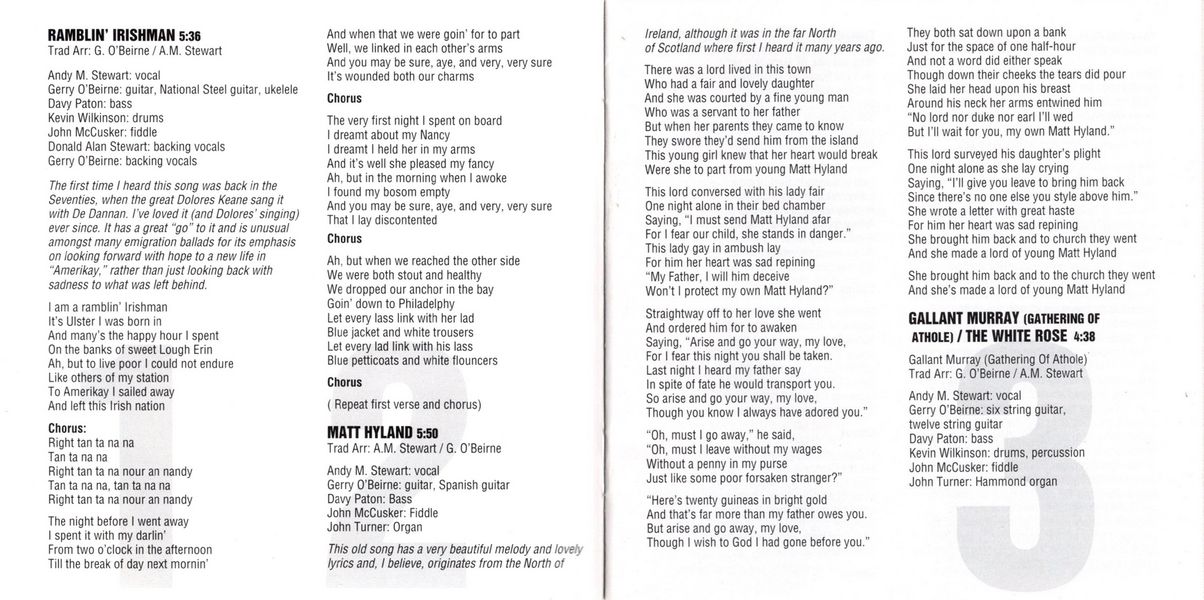
|
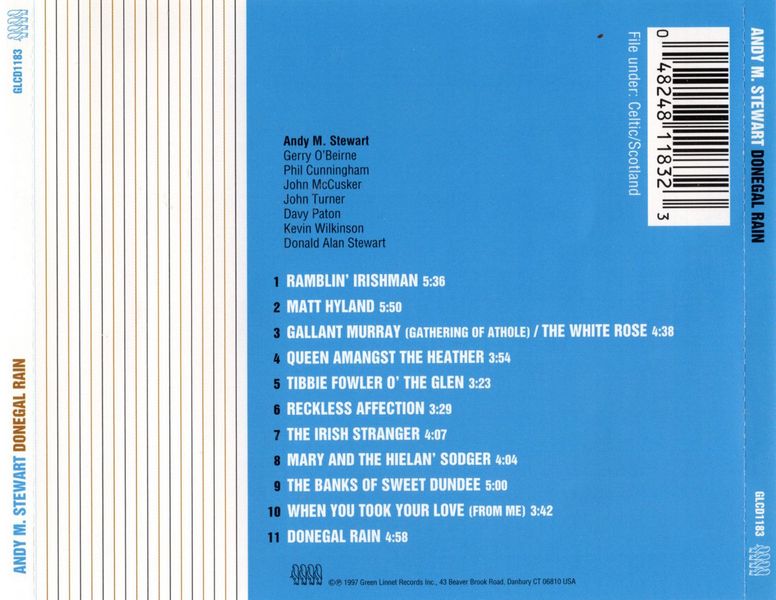

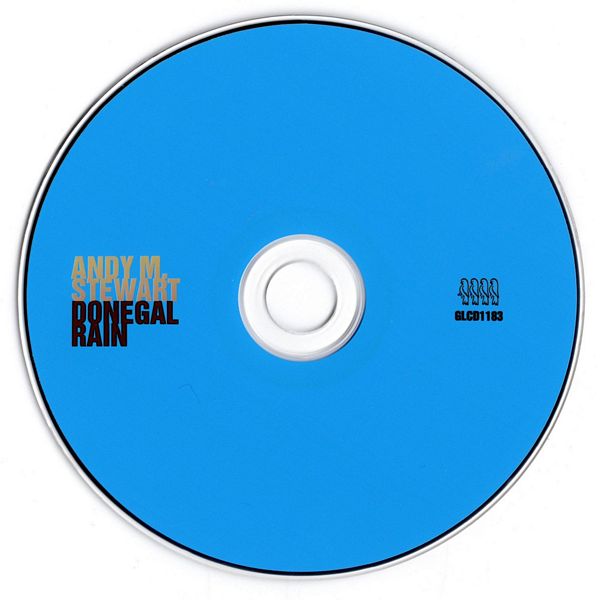
|
| more images |
Sleeve Notes
Ramblin' Irishman — The first time I heard this song was back in the Seventies, when the great Dolores Keane sang it with De Dannan. I've loved it (and Dolores' singing) ever since. It has a great "go" to it and is unusual amongst many emigration ballads for its emphasis on looking forward with hope to a new life in "Amerikay," rather than just looking back with sadness to what was left behind.
Matt Hyland — This old song has a very beautiful melody and lovely lyrics and, I believe, originates from the North of Ireland, although it was in the far North of Scotland where first I heard it many years ago.
Gallant Murray (Gathering Of Athole) & The White Rose — The hero of this song was Lord George Murray, the fifth son of the first Duke of Athole (now spelled Atholl), who, along with his brother the Marquis of Tullibardine, had taken part in the 1715 Jacobite uprising. Murray was wounded at the battle of GlenshieI in 1719, but managed to escape abroad where he served for some years as an officer in the Sardinian army. He eventually received a pardon and returned to Scotland. On Prince Charles Edward Stuart's arrival in Scotland, Lord George joined his standard at Perth in September, 1745. He was appointed as one of the Lieutenants-General of the rebel forces and acted as such at the battles of Preston pans, Falkirk and the final and disastrous Culloden. He was pronounced as having committed high treason but again escaped abroad. He went to Paris in June, 1747, but the "Young Pretender," in spite of all Murray had done and sacrificed for the cause, refused to see him. He then travelled to Rome where he was received with great ceremony by the "Old Pretender," Prince Cherlie's father, who gave him rooms in his palace and introduced him to the Pope. He died on the 11th October, 1760 at Medenblinck in Holland and left an excellent military memoir on the exploits of the insurgent army of "the 'Forty-Five." I love the spirit in this song and it is brilliant fun to sing live. A very small tribute to a brave man.
Queen Amangst The Heather — This was a song I remember from family ceilidhs when I was very young and it was a great favourite of my grandfather, Andy MacGregor from Perthshire. There are many songs in the tradition where two young people of different social classes are tragically attracted to each other, but in this song the young girl is far too smart to be really taken in by the blandishments of the rich young man. However, this doesn't prevent her from having a bit of a fling with him. The version of this song that I sing is from Perthshire but my father, who was from Banffshire, sang a version which contained the lyric: "And the colour of her petticoats were plain tae be seen, they were the colour of the bells of the carlin heather."
Tibbie Fowler O' The Glen — This humorous old ballad was first printed complete in Johnson's Scots Musical Museum in 1789. It was, however, popular much earlier, and a song in the Tea Table Miscellany of 1725 is directed to be sung "to the tune of Tibbie Fowler o' the Glen". I like the song, amongst other things, for it's unusual melody and good drive although the lyric does point to the fact that men are avaricious and largely irredeemable.
Reckless Affection — This is a tale of temptation, confusion, and forbidden love.
The Irish Stranger — I came across this little gem of a song in Dublin in 1996, in an old song collection. It highlights the struggle of the ordinary folk whose simple lifestyle and humble possessions, according to this song, still attracted the greedy attentions of the landowning class. Evictions were commonplace in the 18th century in both Ireland and Scotland and many had to "take to the road," or sell themselves into bonded servitude for a period of years to pay for their passage to the Americas. In spite of its sad subject matter the song somehow gives me the impression that its central character will go on and survive, however resignedly.
Mary and the Hielan' Sodger — Oh the glamour of a man in uniform! This is my version of this old song, but there are many others, with versions coming from Lucy Stewart from Aberdeenshire and a wonderful Irish version, called Mary and the Soldier, recorded by Paul Brady and Andy Irvine on their classic album from 1976.
The Banks of Sweet Dundee — The city of Dundee lies in the county of Angus at the mouth of the River Tay in Scotland about 19 miles from where I was born. However, I learned this song from the singing of the great Joe Heaney from Carna, Galway, in West Connemara, whom I first met by accident, one Sunday in 1979, whilst taking a stroll in New York's Central Park! Joe was rightly recognised as a giant amongst traditional singers and is now sadly missed. The last verse came from John Ord's Bothy Songs and Ballads, published by John Donald, Edinburgh, in 1930. What a woman is the heroine of this song! She just will not allow herself to be pushed around by anyone. There is loads of action in this wonderful old ballad, which I believe is of mixed Irish/Scottish descent. There was a great swapping of songs between Ireland and my part of Scotland, where many people came for work on the farms and in the mills and where many ended up getting married to locals. Consequently, I know quite a few songs which are "hybrids" of this cultural exchange; this may well be another of them.
When You Took Your Love (From Me) — Two close friends of mine ended their relationship. As is often the case one seemed to be doing just fine, though I know for a fact that they were both hurting. This is from the point of view of one of them.
Donegal Rain — Two lovers cruelly separated by political circumstances, but there is hope that love will win through in the end.